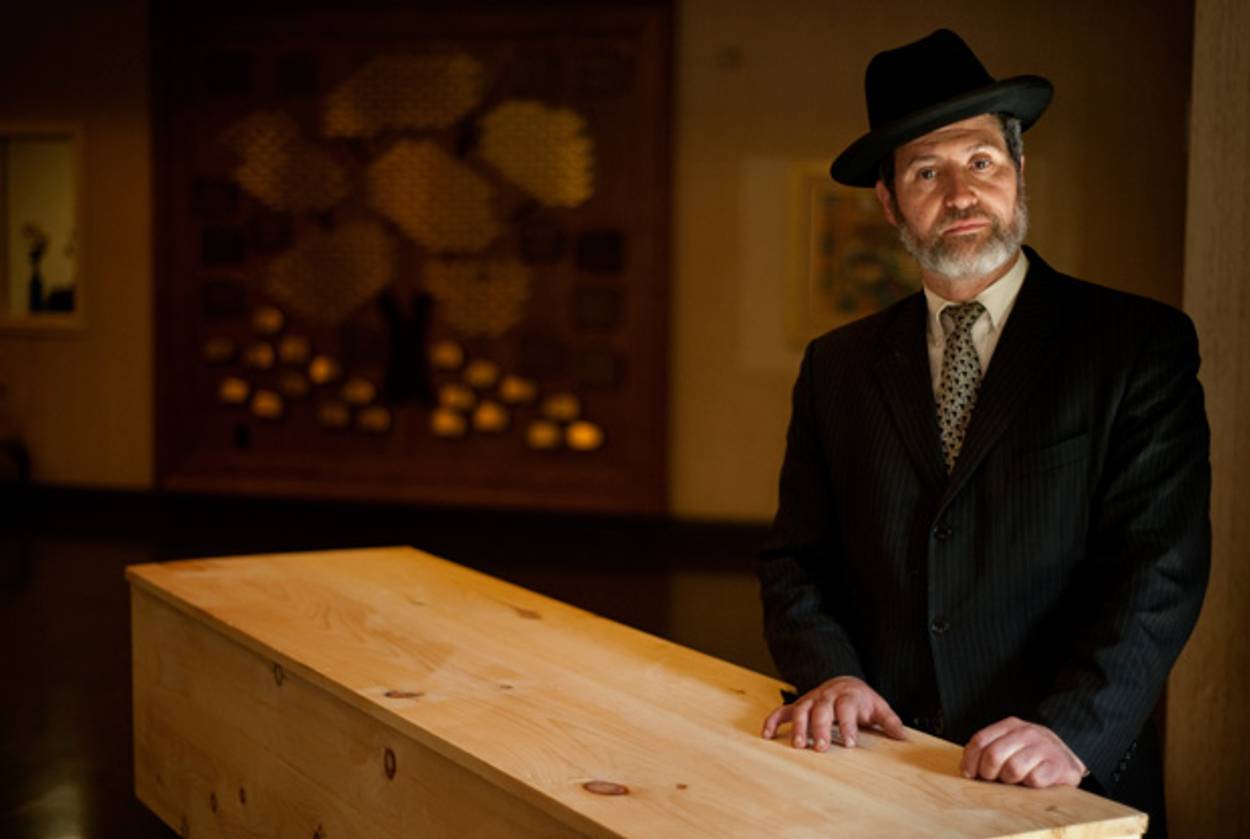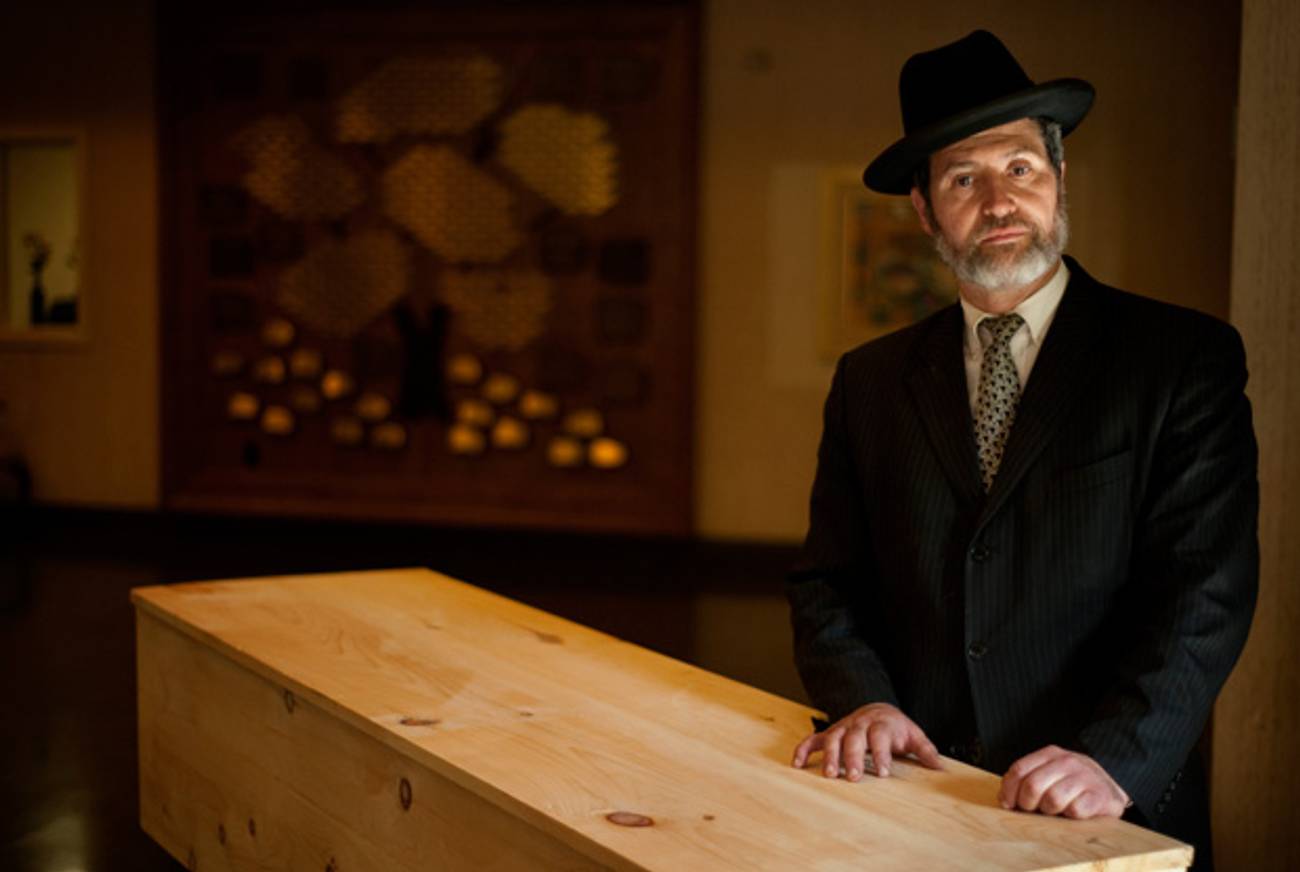Fighting for Jewish Funerals
A Pennsylvania rabbi, backed by a local imam, engages in a battle for full control over religious burials




For more than a decade, Rabbi Daniel Wasserman has been the first point of contact for religious Jews in Pittsburgh seeking a halakhic funeral for their deceased loved ones. But if the Pennsylvania Board of Funeral Directors triumphs in its ongoing dispute with this spirited 47-year-old rabbi, Wasserman may find that he’s unable to preside over another funeral without running afoul of the board’s investigators.
For the past three years, Wasserman has been locked in a bitter conflict with the Funeral Board, the body that licenses and protects commercial funeral directors in the state. At the root of the quarrel is Pennsylvania’s Funeral Director Law, on the books in its present form since 1951. According to the rabbi, the law does not mandate mourners to purchase the services of a commercial funeral director. The Funeral Board believes the opposite, that there is precisely such a mandate—and thus argues that Wasserman, who like many rabbis is not a licensed funeral director, is violating Pennsylvania law. The stand-off has become so charged that on Aug. 6, Wasserman’s lawyers filed a complaint with the district court in Scranton, Pa. The rabbi is demanding $75,000 in damages from the Funeral Board for “the harassment, the illegal investigation, smearing my name, and trying to prevent me from fulfilling my duties,” he said in a recent interview. But what he wants even more is a ruling that will definitively slice away the legal foundations that the funeral directors say underwrite their position.
“I came to the realization that we as a community need to do this under our own auspices,” Wasserman explained of his decision to perform funerals without directors. Taking full control of a Jewish funeral, he adds, is both a requirement of Jewish law (halakhah) and a critical reminder to the community that burying the dead is, as Wasserman put it, “our responsibility—we can’t delegate to outsiders.”
In addition, Wasserman is arguing that the law is being applied selectively and therefore in discriminatory fashion. The large Amish and Mennonite communities in Pennsylvania, he said, carry out their own funerals without funeral directors and with the full knowledge of the Funerals Board. Jews aren’t being singled out because of anti-Semitism, Wasserman insisted when I asked him to explain this anomaly, but he asserted instead that this is “about a perceived revenue stream.” Unlike the rural, self-sustaining communities, Jews represent a largely urban and wealthier demographic and are therefore a prime market for commercial funeral services.
***
The Funeral Director Law was conceived with two main purposes. First, it sets out the public-health requirements in caring for a dead body. Second, it polices the business practices of for-profit firms in one of the few areas of economic activity where demand for such services isn’t subject to the whims of market forces. But nothing in the law, Wasserman’s legal team insists, determines that a funeral director needs to supervise funeral arrangements, so long as Department of Health regulations on the storage of dead bodies are followed. And the demands of traditional Jewish practice, such as washing the body and wrapping it in a shroud, are, Wasserman says, completely in accordance with those guidelines.
Accordingly, after the death of a congregant in December 2009, Wasserman decided to carry out a funeral without the involvement of a funeral director. This was not a decision he took lightly; he’s been considering the practice of Jewish funerals from the time he was ordained. “Literally 24 years ago, I realized we had to re-educate people as to what Jewish tradition demands,” Wasserman told me. This return to the primacy of halakhah, he added, was especially important for communities outside major hubs like New York and Baltimore. “Jewish law is very clear that everyone has to be buried the same way, in the same shroud. The moment you go into a commercial context, that doesn’t happen, because their job is to sell things,” Wasserman said. “It distorts the communal nature of burial practices.” (Nationally the funeral industry generates over $20 billion a year.)
In January 2010, three weeks after the funeral of his congregant, the rabbi received a letter from Daniel D’Alessandro, a licensed funeral director, accusing him of having broken Pennsylvania law by not having had a funeral director present. Following D’Alessandro’s letter, Wasserman found himself under investigation by Pennsylvania’s Bureau of Enforcement and Investigation. “I would be remiss as a licensed funeral director in this state if I didn’t report what was clearly illegal and unlicensed activity,” D’Alessandro told a local journalist. “I could lose my license if I didn’t.”
As the investigation progressed, the Funeral Board stepped up its monitoring of Wasserman. In June 2010, two funeral directors turned up at one of Wasserman’s funeral services to observe the proceedings, leading the deceased person’s son to voice his resentment that the men were present only, in the words of the rabbi’s complaint, “to gather evidence for a complaint … in order to secure future revenue streams.”
The combative approach of the Funeral Board, Wasserman told me, resulted in Orthodox Jews fretting that they will find themselves on the wrong side of Pennsylvania law. The rabbi’s own congregation, Sha’are Torah, stopped allowing him to perform the essential funeral preparations of tahara (washing the body) and shomer (guarding the body until burial) on its premises, fearing that doing so could result in litigation. As a result, Wasserman says, congregants were compelled to turn to the funeral directors, thus compromising what he believes should be the central role of the chevra kadisha (burial society) of the Orthodox Pittsburgh Va’ad Harabbonim (rabbinical council) which he represents.
In May 2012, Wasserman received a letter from prosecuting attorney Shawn E. Smith informing him that his actions in burying his congregant in 2009 would not lead, on this occasion, to prosecution. However, Smith added, “the prosecution division reserves the right to reopen this matter for any reason, such as should additional information be obtained.” Hence Wasserman’s decision to turn to the courts.
I asked Wasserman if he could give me specific examples of funeral directors preventing him from carrying out his duties, or otherwise behaving inappropriately. On one occasion, he said, a funeral director he would not name was adamant that mourners had to leave the room before the casket, rather than walking behind it, as Jewish law demands. “I had no choice but to go along with what he said, since I wasn’t prepared to have a fight with him in front of the family,” said Wasserman. Another time, when Wasserman accompanied a funeral director to remove a body from a private home, he was shocked to see the man distributing business cards to the mourners: “Right in the middle of the grieving, he’s making a commercial!”
Then there was the time that Wasserman was called out in the wee hours to take charge of a dead body. Arriving at the home of the deceased at 2 a.m., Wasserman was told by a funeral director that he could not travel in the minivan transporting the body because of “insurance regulations.” Wasserman followed in his car to the funeral home, where he was denied entry on the grounds that he was not an employee. Instead of standing guard over the body and reciting the Psalms, as dictated by halakhah, Wasserman had to wait outside the building until the home’s official shomer arrived to watch over the body.
Similar objections to the role and function of the funeral directors have been voiced within Pittsburgh’s Muslim community. AbduSemih Tadese, the imam of the Pittsburgh Islamic Center, is openly backing Wasserman against the Funeral Board. In my conversation with him, the imam echoed the point made by the rabbi about the additional burdens the funeral directors place upon vulnerable, grieving families.
“If a Jew or a Muslim dies today, they have to be buried within 24 hours,” Tadese told me. “If you have to deal with the funeral directors, the burial might not take place for two days, three days, sometimes even a week.” Moreover, some of the requirements of the Funeral Board, like the embalming of bodies being transported to other destinations for burial, are expressly forbidden by Muslim and Jewish religious law. “If a Jew is to be transferred to Israel for burial, or if a Muslim does the same in a Muslim country, asking us to perform an embalmment is a violation of our religious rights,” Tadese said.
By way of illustration, Tadese related a disturbing story that followed the death, last month, of one of the Islamic Center’s members. “The family was unable to bury him, so it was our religious duty to do so,” he said. “We had to raise almost $7,000 in order for the funeral home to release the body for burial. The family was sitting in my office crying, because the death took place on a Friday and we couldn’t bury him until Monday.”
Ron Ruman, press secretary for the Pennsylvania Department of State, who answers questions on behalf of the Funeral Board, told me he had no knowledge of this particular episode, but he did stress that “a funeral director cannot refuse to release a body because payment is not made at that time, so if that’s what happened, a complaint could be filed.”
Ruman emphasized that the funeral directors perform an essential public service. “It’s about protecting the consumer—that goes whether it’s the Medical Board, whether it’s an architectural license, or whether it’s funeral directors.”
With that in mind, I asked Rabbi Wasserman whether he might circumvent the conflict by becoming a licensed funeral director himself. “No,” he answered, since obtaining a license requires the study of embalmment, and “for Jews, that’s a desecration of the dead.” More fundamentally, he rejects the principle of state licensing for the performance of religious duties: “Is the State of Pennsylvania going to tell me how to daven, or how to teach gemarah?”
Indeed, while Wasserman finds the commercial imperatives of the funeral directors distasteful—“as soon as they come in, they start talking about different types of caskets and different types of services”—he is at pains to stress that the core issue at stake is the right of clergy to practice their religious traditions free from state intervention. At the same time, he emphasizes that he will obey any court decision: “We are proud citizens of this country. Whatever the court decides, we will listen, we will follow, we will figure out.”
***
Like this article? Sign up for our Daily Digest to get Tablet Magazine’s new content in your inbox each morning.
Ben Cohen, a former BBC producer, is a writer based in New York who publishes frequently on Jewish and international affairs. His Twitter feed is @BenCohenOpinion.
Ben Cohen, a former BBC producer, is a writer based in New York who publishes frequently on Jewish and international affairs. His Twitter feed is @BenCohenOpinion.